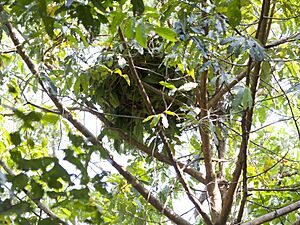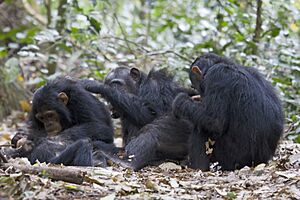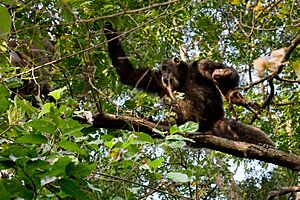Eastern chimpanzee facts for kids
Quick facts for kids Eastern chimpanzee |
|
|---|---|
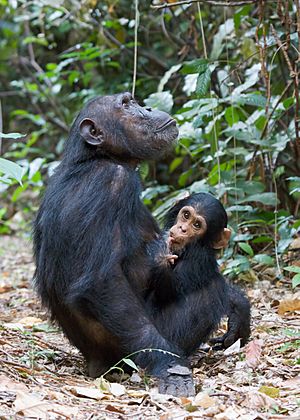 |
|
| A mother with a young at Gombe Stream National Park, Tanzania | |
| Conservation status | |
| Scientific classification |
|
| Kingdom: | Animalia |
| Phylum: | Chordata |
| Class: | Mammalia |
| Order: | Primates |
| Suborder: | Haplorhini |
| Infraorder: | Simiiformes |
| Family: | Hominidae |
| Subfamily: | Homininae |
| Tribe: | Hominini |
| Genus: | Pan |
| Species: | |
| Subspecies: |
P. t. schweinfurthii
|
| Trinomial name | |
| Pan troglodytes schweinfurthii (Giglioli, 1872)
|
|
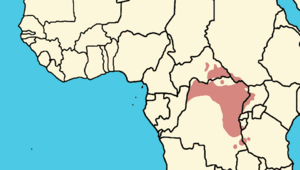 |
|
The eastern chimpanzee (Pan troglodytes schweinfurthii) is a type of common chimpanzee. It lives in parts of Central Africa and East Africa. You can find them in countries like the Central African Republic, South Sudan, the Democratic Republic of the Congo, Uganda, Rwanda, Burundi, and Tanzania.
Contents
Understanding Eastern Chimpanzees
The eastern chimpanzee is a subspecies of the common chimpanzee. This means it's a specific group within the larger chimpanzee family. Some scientists, like Colin Groves, think there might be enough differences between northern and southern groups of eastern chimpanzees to split them into two separate subspecies.
Why Eastern Chimpanzees Need Our Help
The eastern chimpanzee is currently listed as Endangered. This means they are at a very high risk of disappearing forever. Even though common chimpanzees are the most common great apes, their numbers are dropping fast in East Africa.
One big reason for this decline is hunting. Another is the loss of their homes, called habitat. Chimpanzees and humans are very similar in their bodies. This means chimpanzees can get many of the same sicknesses that humans do. Because of this, research and tourism need to be managed carefully. This helps stop diseases from spreading between humans and chimpanzees. Dr. Jane Goodall has studied this subspecies a lot at Gombe Stream National Park.
What Eastern Chimpanzees Look Like
Adult chimpanzees living in the wild usually weigh between 40 and 65 kilograms (about 88 to 143 pounds). Males can stand up to 145 centimeters (about 57 inches) tall. Females are a bit smaller, reaching up to 120 centimeters (about 47 inches) in height.
Their bodies are covered with thick, black hair. However, their faces, fingers, toes, and the palms of their hands and soles of their feet are bare. Like humans, they have opposable thumbs and big toes. This special feature lets them grip things very precisely. Most eastern chimpanzees have amber or brown eyes with dark whites around the colored part.
Where Eastern Chimpanzees Live
Eastern chimpanzees spend time both in trees and on the ground. They usually sleep in a tree at night. They build a special nest there to rest safely. They used to live across a much larger area. Sadly, their living spaces have shrunk a lot in recent years.
How Eastern Chimpanzees Live
Chimpanzees live in groups called communities. These communities can have anywhere from 20 to over 150 members. However, they often travel in smaller groups of just a few individuals. Eastern chimpanzees are good at moving both in trees (arboreal) and on the ground (terrestrial). They rest in trees at night but spend their days on the ground.
Chimpanzees walk on the soles of their feet and their knuckles. This is called 'knuckle walking'. They can also walk upright on two legs for short distances.
When they face a predator, chimpanzees will scream loudly. They might also throw objects at the threat. The African leopard is their main natural enemy. However, lions have also been known to hunt chimpanzees.
What Eastern Chimpanzees Eat
Chimpanzees are omnivorous. This means they eat both plants and animals. Their diet includes seeds, fruits, honey, leaves, bark, and fungi. They also enjoy insects like termites and ants. Sometimes, they hunt small animals such as birds and monkeys.
Chimpanzees are smart tool users. They often use twigs to get termites or ants out of their nests. They have also been seen using sticks to hunt other small mammals. Sometimes, they even hunt in organized groups. For example, they might kill leopard cubs. This is usually to protect themselves, as leopards are a big danger to them.
See also
- Bili ape
- Chimp Haven
- Great ape personhood
- Ngamba Island Chimpanzee Sanctuary
- Theory of mind
- The Third Chimpanzee
 | William L. Dawson |
 | W. E. B. Du Bois |
 | Harry Belafonte |



